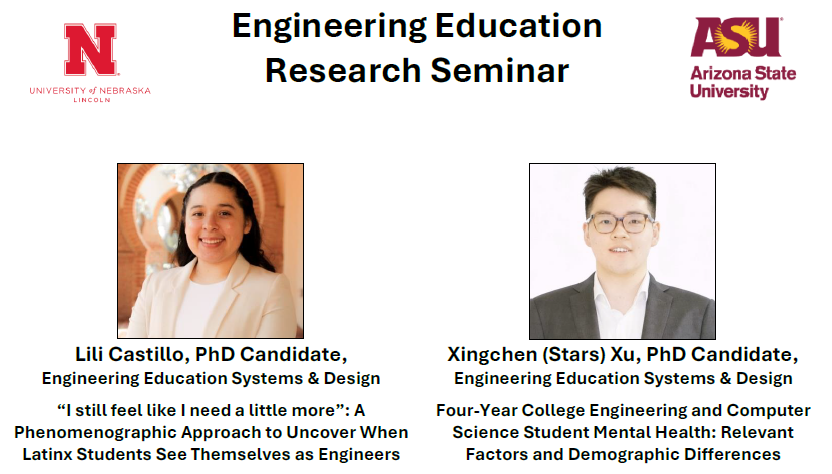
Join us for a special dual-speaker seminar featuring two Engineering Education Researchers, each presenting new work on the factors shaping students’ experiences in engineering pathways.
Event Details
Date: Friday, December 5th
Time: 9:00–10:00 am CT / 8:00–9:00 am MST
Location:
Zoom - Meeting ID: 961 981 05058
All are welcome to attend this informative session that connects identity, well-being, and educational practices in engineering.
Speaker 1: Lili Castillo, PhD Candidate, Engineering Education Systems & Design, Arizona State University
Title: I still feel like I need a little more”: A Phenomenographic Approach to Uncover When Latinx Students See Themselves as Engineers
Abstract:
Engineering role identity is a dynamic process influenced by individual expectations and environmental factors, particularly sociocultural influences. Existing literature highlights the link between a strong engineering identity and students' persistence, major choices, and sense of belonging. However, little is known about when students start to identify as engineers, which is crucial for understanding their development. This study examines Latinx students' temporal perspective of their engineering identities and the sociocultural factors that shape its development. This phenomenographic approach used, semi-structured interviews with 15 upper-division Latinx students from three Hispanic-serving institutions in the U.S. Southwest. Findings revealed three distinct engineering role identity time perspectives: (1) present-oriented, (2) liminal, and (3) aspirational. Overall, this study aims to expand our understanding of engineering identity as a development process and provide practical strategies to better support Latinx students with liminal and aspirational engineering identities.
Speaker 2: Xingchen (Stars) Xu, PhD Candidate, Engineering Education Systems & Design, Arizona State University
Title: Four-Year College Engineering and Computer Science Student Mental Health: Relevant Factors and Demographic Differences
Abstract:
Mental health challenges are increasingly recognized as critical barriers to academic success and overall well-being among university students, particularly in high-intensity disciplines such as engineering and computer science. While prior research has examined factors influencing students’ mental well-being, less is known about their relative importance and how they vary across demographic groups. In this study predictors of mental health changes among Eng. and CS undergraduates were identified and ranked. Variations across gender, race/ethnicity, and first-generation status were examined. Random forest analysis was used to integrate data from the nationally representative BPS 12/17 Survey, the American Community Survey, and FBI Hate Crime data. Results indicate that physical health is the most important predictor of mental health outcomes, followed by academic preparation, institutional characteristics, social support, and psychological factors. These findings suggest that effective interventions must integrate physical infrastructure with psychological support mechanisms. Special attention should be given to the intersectional experiences of marginalized and first-generation students to promote more equitable mental health outcomes.